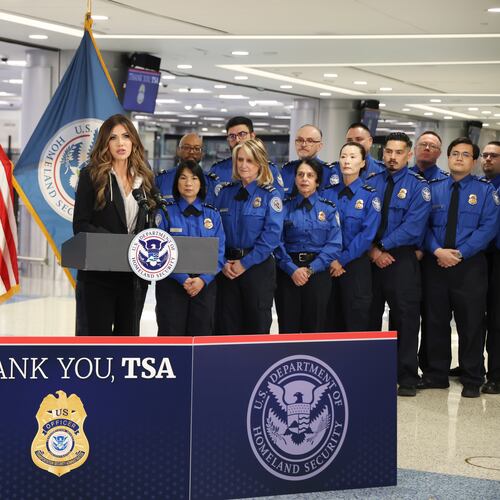The system for security clearances has always been a cornerstone of our national defense. These safeguards ensure that individuals entrusted with roles requiring access to the nation’s most sensitive information undergo rigorous vetting to confirm they are trustworthy, reliable and free of vulnerabilities.
Yet, on his first day back in office, President Donald Trump signed a memorandum to “resolve the backlog” of security clearances for personnel in the Executive Office of the President. This executive order bypasses the standard clearance process, granting appointees interim Top Secret/Sensitive Compartmented Information (TS/SCI) access for up to six months. The stated justification was to address delays allegedly created by the Biden administration.
Credit: Handout
Credit: Handout
But the process isn’t broken. It’s deliberate, thorough and essential for protecting the country’s secrets. By bypassing the vetting process, Trump effectively grants appointees access to classified information without ensuring they are free of vulnerabilities or compromising ties.
This reckless shortcut undermines the very safeguards designed to prevent insider threats and foreign exploitation.
When I applied to the CIA to be an intelligence analyst, I knew the agency would scrutinize every aspect of my life — financial history, personal relationships and significant decisions — before granting me TS/SCI access. My qualifications — such as my experience as an infantry officer and my graduate studies — were not enough. Polished interviews or even demonstrated patriotism didn’t suffice either. The CIA required proof that I could not only protect classified information but that I had no vulnerabilities that could be exploited.
This same scrutiny has been applied to everyone who has served in such sensitive national security posts, from junior analysts to senior leaders. No one has been exempt. Those entrusted with our nation’s most sensitive information, whether at the CIA, the Pentagon or the White House, undergo this vetting process.
Moreover, this diligence doesn’t end once a clearance is granted. Reassessments occur, and sometimes random inquiries are triggered to ensure continued reliability. People change — financial circumstances deteriorate, personal relationships shift or other pressures arise. A person cleared today can become a vulnerability tomorrow.
What makes Trump’s executive order particularly dangerous is that it politicizes a system meant to ensure impartiality. By bypassing the clearance process, it sends a clear signal that loyalty and expedience are valued over diligence and safeguards, undermining the trust and integrity that the clearance system is built on.
This abuse of authority is further evidenced by a related executive order targeting former officials. In an unprecedented move, Trump revoked the security clearances of dozens of individuals, including former CIA directors and senior national security leaders. Many of these officials, whom I have served with or under directly, dedicated their careers to safeguarding the nation. The executive order suggests these respected individuals used their clearances to interfere in the 2024 election — an apparent justification for silencing critics and political opponents who either refused to endorse him or supported President Joe Biden’s reelection.
This is more than an act of petty political retribution; it is a veiled threat to silence dissent and erodes the nonpartisan foundation of the national security apparatus. By this same definition of a “security threat,” this essay could make me the target of similar actions. Weaponizing security clearances in this way undermines trust in a system designed to prioritize the nation’s safety over personal or political loyalties.
Trump might argue that the nation’s peril is so grave, so unprecedented, that extraordinary measures are not only justified but necessary. His executive order frames the delays in the clearance process as a “backlog created by the Biden Administration,” claiming that these delays prevent key personnel in the Executive Office of the President from performing their duties. However, every incoming president has faced profound crises — circumstances demanding swift, decisive action. Through economic collapse, global wars, nuclear brinkmanship and acts of terror, the standards for security clearances have held firm. To suggest that Trump’s challenges are so uniquely burdensome as to warrant exemptions is disingenuous and diminishes the resolve and integrity of those who led through far greater tests of leadership.
History offers painful reminders of the consequences of undermining such protective measures. Aldrich Ames and Robert Hanssen, two of the most damaging spies in U.S. history, exploited gaps in oversight and evaded detection for years, causing catastrophic harm. Their actions cost lives, compromised missions and demonstrated why rigorous and impartial vetting must be nonnegotiable. When the clearance system is bypassed or politicized, it opens the door to vulnerabilities that our adversaries are eager to exploit.
Instead of dismantling or bypassing these safeguards, we should focus on strengthening them.
Delays in the clearance process, while frustrating, stem from underfunding and understaffing, not from flaws in the system itself. Expanding the investigative workforce and leveraging technology could reduce backlogs without compromising security.
Security clearances are not a privilege or a political bargaining chip — they are a cornerstone of our national defense. Politicizing or shortcutting this process, whether for convenience or retribution, is not just irresponsible — it is dangerous.
Brian O’Neill, a recently retired senior executive from the CIA and National Counterterrorism Center, is an instructor on strategic intelligence at Georgia Tech.
About the Author
Keep Reading
The Latest
Featured

